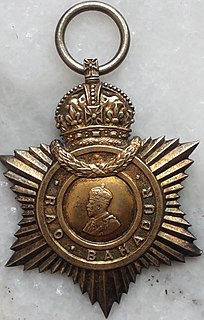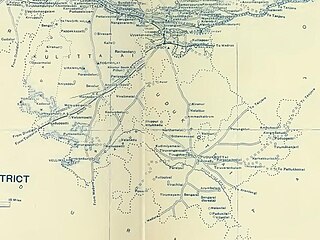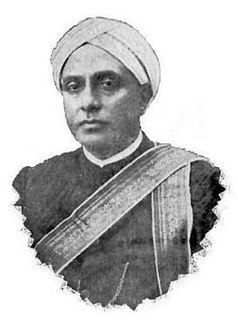Related Research Articles

Rai Bahadur, abbreviated R.B., was a title of honour bestowed during British rule in India to individuals for faithful service or acts of public welfare to the Empire. From 1911, the title was accompanied by a medal called a Title Badge. Translated, Rao means "prince", and Bahadur means "brave" or "most honourable". Bestowed mainly on Hindus, the equivalent title for Muslim and Parsi subjects was Khan Bahadur. For Sikhs it was Sardar Bahadur.
Diwan Bahadur Agaram Subbarayalu Reddiar was a landlord and Chief Minister or Premier of Madras Presidency from 17 December 1920 to 11 July 1921.

Diwan Bahadur Sir Perungavur Rajagopalachari, KCSI, CIE, also spelt in contemporary records as Sir P. Rajagopala Achariyar, was an Indian administrator. He was the Diwan of Cochin State from December 1896 to August 1901 and of Travancore from 1906 to 1914.

Sir Amaravati Seshayya Sastri, or Sashiah Sastri, was an Indian administrator who served as the Diwan of Travancore from May 1872 to 4 May 1877 and as the Diwan of Pudukkottai from 1878 to 1894. He is credited with having modernized the city of Pudukkottai.

Vembaukum RamiengarCSI was an Indian civil servant and administrator who served as the Diwan of Travancore from 1880 to 1887.

Pudukkottai was a kingdom and later a princely state in British India, which existed from 1680 until 1948.

Diwan Bahadur V. S. Subrahmanya Iyer was an Indian administrator who served as the Diwan of the princely state of Travancore from 1929 to 1932.

Diwan BahadurVeeraraghavapuram Nagam Aiya was an Indian historian, civil servant, and chronicler who served as the Dewan in the erstwhile princely state of Travancore.
Diwan Bahadur Sir Mannath Krishnan NairKCIE (1870–1938) was an Indian politician from the Indian National Congress and later, Justice Party who served as a member of the Madras Legislative Council and later, executive council of the Governor of Madras. He also served as the Chief Justice of Travancore High Court and later Diwan of Travancore from 1914 to 1920
Sir Albion Rajkumar Banerjee was an Indian civil servant and administrator who served as the Diwan of Cochin from 1907 to 1914, Diwan of Mysore kingdom from 1922 to 1926 and as Prime Minister of Kashmir from 1927 to 1929.
Diwan Bahadur Cherubala Pathayapura Karunakara Menon (1891–1976) was an Indian civil servant and administrator who served as the Diwan of Cochin kingdom from 1944 to 1947. He was the last Diwan of the kingdom and served until its accession to the Indian Union.
Sir Alexander Robert Loftus TottenhamCIE was a British civil servant and administrator who served as the Diwan of Pudukkottai state from 1934 to 1946.
Benjamin George HoldsworthCIE was an Indian civil servant and administrator who served as the Diwan of Pudukkottai state from 1931 to 1933.
R. Vedantacharlu was an Indian administrator who served as the Diwan of Pudukkottai state from November 1894 to February 1899.

Diwan BahadurSir Narasimha Ayyangar Gopalaswami Ayyangar, CSI, CIE, Member of the Drafting Committee of the Constitution, was a leader of the Rajya Sabha and a cabinet minister in the Government of India, first as a minister without portfolio but looking after Kashmir Affairs, and later as the railway minister.
Diwan Bahadur Jannyavula Venkatanarayana Rao NaiduCIE (1870–1955) was an Indian civil servant, writer and politician who served as Commissioner of Madras city from 1925 to 1928.

Dewan Bahadur / Diwan Bahadur was a title of honour awarded during British rule in India. It was awarded to individuals who had performed faithful service or acts of public welfare to the nation. From 1911 the title was accompanied by a special Title Badge. Dewan literally means Prime Minister in Indian context and Bahadur means brave.
The New Year Honours 1921 were appointments by King George V to various orders and honours to reward and highlight good works by members of the British Empire. They were published on 31 December 1920.
The 1930 New Year Honours were appointments by King George V to various orders and honours to reward and highlight good works by citizens of the United Kingdom and British Empire. They were announced on 31 December 1929.
The 1911 Delhi Durbar was held in December 1911 following the coronation in London in June of that year of King George V and Queen Mary. The King and Queen travelled to Delhi for the Durbar. For the occasion, the statutory limits of the membership of the Order of the Star of India and the Order of the Indian Empire were increased and many appointments were made to these and other orders. These honours were published in a supplement to the London Gazette dated 8 December 1911.
References
- Manual of the Pudukkottai state. Government of Tamil Nadu. 2004.
- Kapa Mitra. April 2003.